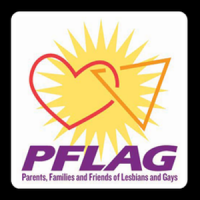Winning Transgender Support and Acceptance at PFLAG (1996)

©1996 by Dallas Denny
Source: Denny, Dallas. (1996, September). Winning transgender acceptance and understanding at PFLAG. AEGIS News, 1(8), p. 11.
Winning Transgender Acceptance and Understanding at PFLAG
By Dallas Denny
Atlanta Pride is a huge celebration, with hundreds of thousands of gay, lesbian, bisexual, and transgendered participants and several hundred vendors, most of which are nonprofit corporations. For the past five years, AEGIS has been at Pride, distributing literature and building bridges. In 1995 and 1996, the various Atlanta transgender organizations worked together to fund and staff a large booth and provide a sizeable contingent of transgender marchers in the parade. But in 1992, 1993, and 1994, there was only a small booth, manned by myself and a few other volunteers.
In 1994, PFLAG had a large and busy booth just across the way in the Pride Market at Piedmont Park. I had heard about this group, Parents and Friends of Lesbians and Gays, only when, in 1992 or 1993, one of their chapters volunteered as a public service, to clean up a section of public highway in North Carolina. Unlike those of any number of other groups, PFLAG’s signs were defaced or torn down on several occasions, which resulted in national publicity.
At some point during Pride 1994, I strolled over to the busy PFLAG exhibit (it seemed every gay man and lesbian in the park was making his or her way to the PFLAG booth to thank them for being there). I introduced myself to one of the half-dozen or so volunteers in the booth and gave her some literature and told her of the almost total lack of support for the families and friends of transgendered and transsexual people. I told her that many of the issues facing gay and lesbian people—coming out, job discrimination, rejection by our families—were the same for transfolk, and said we could certainly use their help. “What is your policy,” I asked, “about transgendered people?”
My simple question caused considerable confusion. In a chain reaction, each volunteer turned to the next; there were hushed conversations, waving hands, nodding heads. Finally an answer came back: “Sure, they can come—if they are gay or lesbian,” someone told me.
I didn’t think the best place to ask PFLAG, “What constitutes homosexuality when gender is fluid?” was in the hot sun in a milling crowd on a Sunday afternoon, so a week or two later I sent the Atlanta chapter a letter, accompanied by Chrysalis, the AEGIS Transition Series booklets, and other materials, respectfully asking that we begin talking about our common issues.
I didn’t get a reply to that letter or to the next, or to two similar letters to PFLAG National. So I sent a third letter, letting both PFLAG Atlanta and PFLAG National have it with both barrels, accusing them of ignoring transgender and transsexual issues even to the point of not answering correspondence.
That, of course, did get dialogue started. I sent lots of educational materials to PFLAG National and spoke at a Board meeting of the Atlanta chapter, telling them of the isolation of many transgendered people and the anguish of their families. The Atlanta chapter did not, of course, come to an immediate decision to throw open its door to all transfolk, but I had achieved my purpose—we were no longer faceless others, but people made of flesh and blood, and our needs were known to the chapter.
The reaction of PFLAG National was even more positive. Before long, I received a copy of the transgender information packet Sharon mentions in her article on page 8, with definitions taken (with credit, of course), from one of our Transition Series booklets. You can imagine how exuberant I felt when I received that packet.
At approximately the same time that I was in communication with PFLAG Atlanta, Phyllis Frye and Sarah DePalma approached PFLAG Houston about trans inclusion. The Houston group was much less receptive than the Atlanta chapter, eventually closing its doors firmly in Phyllis and Sarah’s faces. No doubt other transfolk were approaching other PFLAG chapters at the same time. Obviously, Sharon Stuart was. Who was actually “first” is of little relevance. What was important was the issue was being raised on a number of fronts, letting PFLAG know transgender/transsexual inclusion was a widespread need, and not just a flash-in-the-pan issue raised by a single person or group.
I was gratified when I learned on the internet that PFLAG had started an electronic mailing list to discuss transgender issues. And I positively beamed when Jessica Xavier kindly sent me Sharon’s article from a recent PFLAG newsletter.
I am grateful to and proud of PFLAG for rising to what was a surprise and a challenge—the needs of transgendered and transsexual people and their families. And I’m proud of myself and others in the trans community for educating PFLAG about our issues and winning enough hearts and minds to cause this great organization to serve our own people in a way we been unable to.
Being the partner, child, or other family member of a gay men or lesbian is a considerable challenge. It takes a great deal of courage to stand proudly beside your gay son or daughter when doing so can draw the ire of the immmoderate right and make you a target for hate mail or hate crimes. It takes even more courage to directly challenge the radical right, as PFLAG has done, by striking at its core. Some of you may know PFLAG produced two public service announcements which featured television clips of the venomous anti-gay rhetoric of Pat Robertson, Jerry Falwell, and Jesse Helms, interspersed with quick shots of a gay bashing in one advertisement, and a young girl contemplating suicide in the other.
It took courage to produce those clips. It took another, and perhaps more fundamental type of courage to respond rationally to the issue of transgender inclusion.
Well done, PFLAG!
